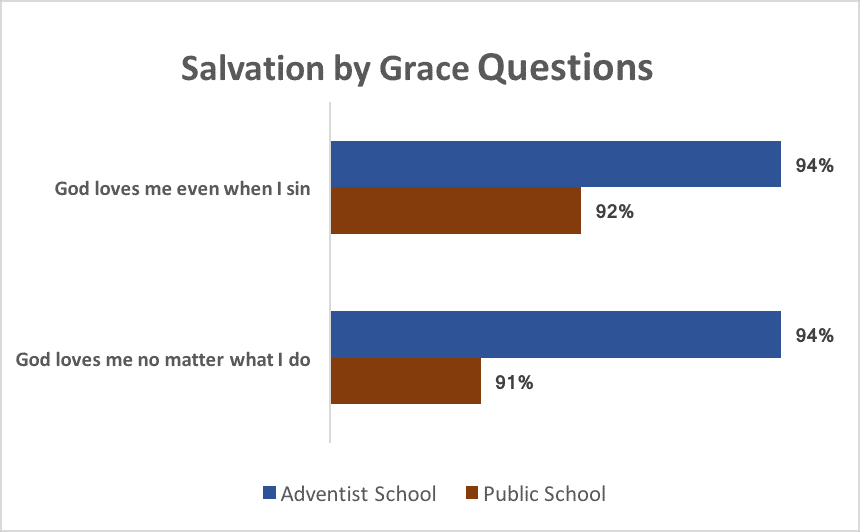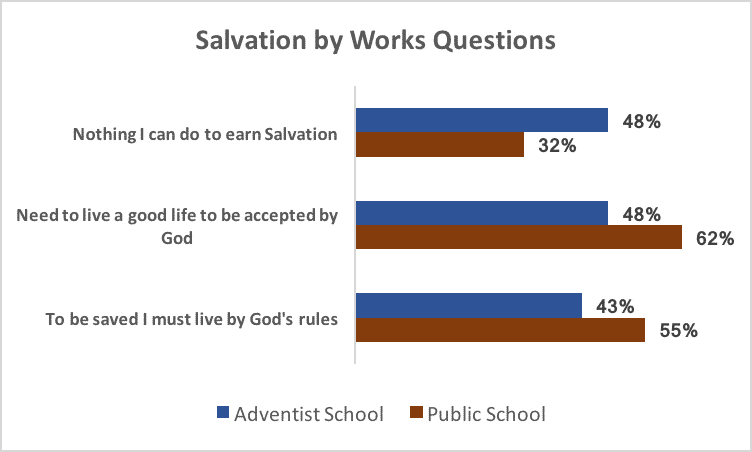Our ideas of education take too narrow and too low a range. There is need of a broader scope, a higher aim. True education means more than the pursual of a certain course of study. It means more than a preparation for the life that now is. It has to do with the whole being, and with the whole period of existence possible to man. It is the harmonious development of the physical, the mental, and the spiritual powers. It prepares the student for the joy of service in this world and for the higher joy of wider service in the world to come.
Ellen White, Education, p. 14
Many Seventh-day Adventists feel very strongly about the importance of educating our children in denominational schools; while public schools may do a fine job educating children’s minds, they often neglect a wholistic education—specifically, they neglect training children spiritually. Adventist schools, however, strive to give children a well-rounded education, with a focus on spiritual matters.
One might ask, then, how Adventist education impacts students when it comes to their views on important principles compared to the views held by their public school-attending counterparts.
A study conducted in 2014 by Petr Cincala, director of the Institute for Church Ministry (ICM) examined the beliefs and relationship that pathfinders at the Forever Faithful International Pathfinder Camporee had to the Adventist Church. Pathfinders—mostly from the North American Division (NAD) but some from other divisions— were asked a variety of questions about their understanding of basic Adventist doctrines, as well as how these apply to their personal lives.
Out of the 940 pathfinders (ages 14-22) surveyed, 35% of them indicated that they attend an Adventist school, with another 6% attending Christian schools. An additional 45% shared that they attend public school. Fourteen percent of respondents attend another type of school (including homeschool).
As part of the 2014 study, researchers examined young people’s views on grace, and were encouraged that young people—for the most part—still maintain a grace orientation in regards to salvation. However, there was a small difference in how attendees of public school answered versus how those who attended Adventist school responded.

- When asked to respond to the statement, “I know that God loves me no matter what I do,” 91% of public school attendees agreed, while 93.5% of Adventist school attendees agreed.
- When asked about their views on the statement, “I am loved by God, even when I sin,” 91.6% of public school-attending students agreed, while 93.5% of Adventist school-attending students agreed.
While it is encouraging that most young people have adopted a faith-oriented understanding of salvation, it should be noted that Adventist schooling only appears to make a small difference in a young person’s understanding of these topics. This reflects well on the training that young people are receiving elsewhere—most likely in their homes and local churches.
When it came to responding to statements about salvation by works, however, there were some interesting differences between public and Adventist school attendees. When asked to respond to the statement, “I know that to be saved, I must live by God’s rules,” about one in three (43%) of youth attending an Adventist school agreed with this statement while over half (55%) of young people attending a public school agreed.Additionally, in response to the statement, “There is nothing I can do to earn salvation,” nearly one third (32.2%) of public school attendees agreed, while a much larger number (47.7%) of Adventist school attendees agreed.
Another area in which youth responses differed based on the type of school they attended was in regards to the statement, “The way to be accepted by God is to live a good life.” A little less than half (48%) of Adventist school-attending students agreed with this statement, while nearly two-thirds (62%) of public school-attending students agreed.

Roger Dudley, of ICM, conducted a similar study in 1992 that focused on individuals from within the NAD. Dudley noted that, in this study, “Our Adventist teenagers … demonstrated a good understanding of salvation by grace alone. They were much more likely to adopt a grace orientation… than a law orientation” (Dudley 1992: 22). The Camporee 2014 research not only confirms Dudley’s claim but also indicates his assesmentabout Adventist teenagers is even more evident in pathfinders attending Adventist schools compared to those attending Public schools.
It is essential to note that that no one should rely solely on a single organization to teach children and young people the Truth—be it the home, school, or church. Each of these serves as a training arena, a way to reinforce specific thoughts and ideas. By teaching our young people the Truth and emphasizing it in all areas of life, we are able to ensure that they have a solid scriptural basis and a good understanding of important concepts. Wholistic education should be our ultimate goal!
Creado en colaboración con el Instituto del Ministerio de la Iglesia (Institute of Church Ministry).
Published by ASTR

